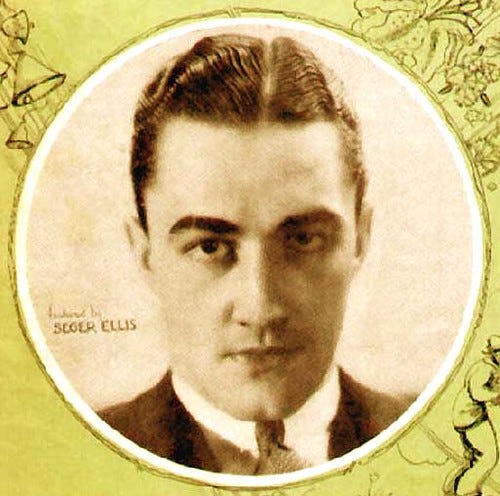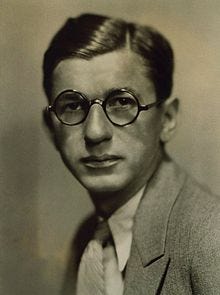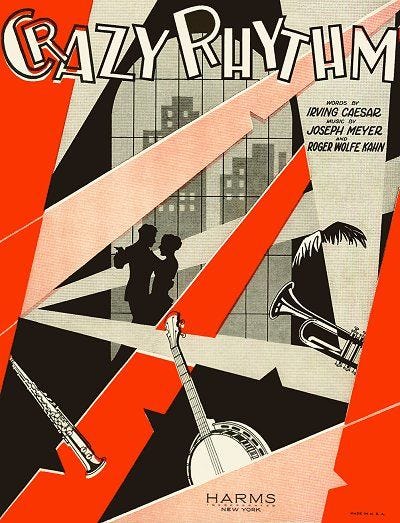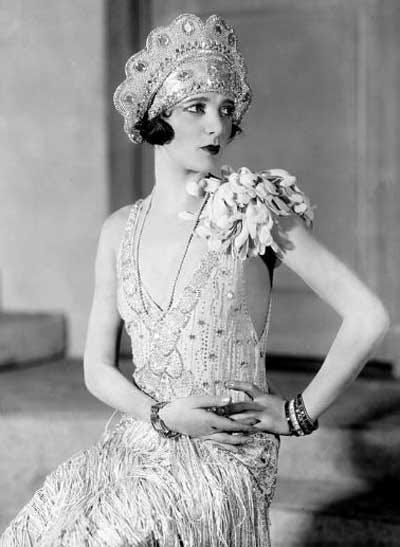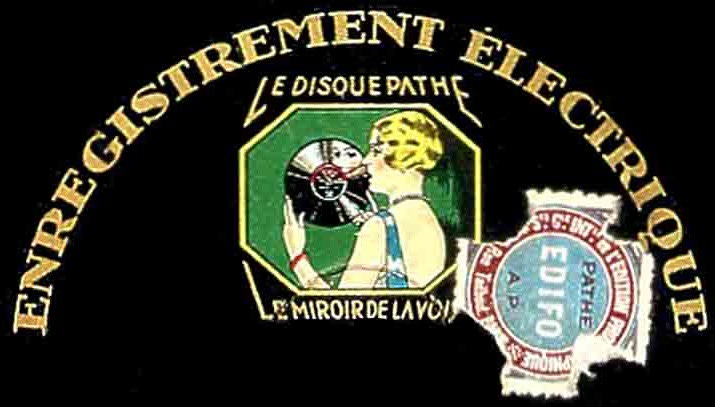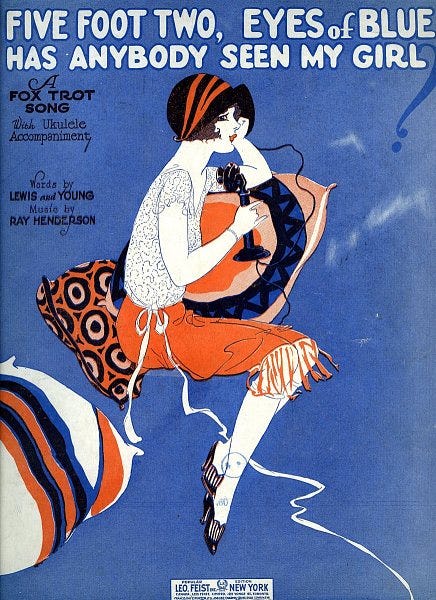Songwriters: Ray Henderson / Sam Lewis / Joseph Young
BIRTHDAYS
1904
Seger Ellis, leader, vocals
d. 9/29/1995 at 91.
Biography
~by Eugene Chadbourne
"You're All I Want for Christmas" is one of the standard songs associated with Seger Ellis, an artist whose striking career also included jazz piano playing, a film appearances alongside the fascinating Ida Lupino and leading an eccentric brass choir.
He began tinkling on the keyboard as a boy and was first engaged professionally as a radio performer in Texas in the mid '20s. This is where a roving talent scout from the Victor label heard him, resulting in Seger's first recordings. He was inspired to try a move to New York City, making out quite well there with a new series of sides spotlighting his vocal talents. He toured England in 1928 as a soloist.
Ellis revealed yet another talent following a meeting with the popular vocal group the Mills Brothers in Cincinatti. He became the manager of this group for a few years, continuing to perform as a soloist through the '30s.
Highlights of this period in which Ellis was in great demand include guest shots with the Paul Whiteman orchestra and the aforementioned film appearance, the 1934 One Rainy Afternoon. Beginning in 1936, Seger spent nearly a year creating music with a group he called the Brass Choir, then assembled something of a more normal instrumental big-band line-up for another group under his leadership.
In the early '40s he was briefly in the Army, followed by a stint working in a defence plant. After moving back to Texas he began to be less active as a performer and more involved in the songwriting craft. His Christmas ditty was recorded by the likes of Al Martino, Frankie Laine and Bing Crosby. The Seger Ellis songwriting catalog also includes "No Baby, Nobody But You" and "You Be You but Let Me Be Me".
1895
Irving Caesar, Lyricist
b. New York, NY
d. Dec. 18, 1996, New York, NY
Irving Caesar (born Isidor Keiser) was an American lyricist and theater composer who wrote lyrics for numerous song standards including "Swanee", "Sometimes I'm Happy", "Crazy Rhythm", and "Tea for Two", one of the most frequently recorded tunes ever written.
In 1972 he was inducted into the Songwriters Hall of Fame.
1898
Gertrude Lawrence
Gertrude Lawrence (July 4, 1898 – September 6, 1952) was an English actress, singer, dancer and musical comedy performer known for her stage appearances in London's West End and on New York's Broadway.
Noël Coward & Gertrude Lawrence in Private Lives
Gertrude Lawrence - Wikipedia
Gertrude Lawrence (1898 - 1952) - Find A Grave Memorial
1902
Erik Tuxen
Erik Tuxen (4 July 1902 - 28 August 1957) was a Danish big band leader, composer and arranger, who worked for most of his life in Denmark.
Tuxen was also a prolific film arranger, responsible for the musical direction for many Danish films in the 1930s and 1940s.
1889
Joe Young, Lyricist, Tin Pan Alley
b. New York, NY, USA.
d. April 21, 1939, New York, NY, USA.
Biography
~by Joslyn Layne
Tin Pan Alley lyricist Joe Young wrote prolifically from early 1910 through the late '30s, usually with songwriting partner and lyricist Sam M. Lewis. Born in N.Y.C. in 1889, Young got his first job in the music business as a singer in a publishing house. His hits before teaming up with Lewis in 1916 include "Don't Blame It All on Broadway" (1913).
Young and Lewis collaborated with a number of different composers -- including George Meyer, Fred Ahlert, Jean Schwartz, and Ray Henderson -- on many successful songs, some of which were used in stage musicals like Sinbad (1918) and Kid Boots (1924).
Lewis and Young had a prolific output and remained partners through 1930, when they worked with composer Harry Warren on the early "talkie" Spring Is Here, which featured several hits, including "Have a Little Faith in Me." Some of their best-known songs include "Rock-a-bye Your Baby With a Dixie Melody" (1918),
"How Ya Gonna Keep 'Em Down on the Farm?" (1919), "Five Foot Two, Eyes of Blue," "I'm Sitting on Top of the World" (1925), "In a Little Spanish Town" (1926), and their last lyric, "Absence Makes the Heart Grow Fonder" (1930).
After parting ways with Lewis, Young scored the 1931 Broadway show The Laugh Parade and wrote many hits, including "In a Shanty in Old Shanty Town" (1932), "Your Gonna Lose Your Gal" (1933), and "I'm Gonna Sit Right Down and Write Myself a Letter" (1936).
Young is also a member of the Songwriters Hall of Fame.
Joe Young (lyricist)
Songwriters Hall of Fame Joe Young
Notable Events Occurring On This Date Include:
1943.
For the first time since the 1930s, The Rhythm Boys: Bing Crosby, Al Rinker and Harry Barris were reunited on NBC's Paul Whiteman Presents.
Songs Recorded/Released On This Date Include:
1927
Jelly Roll Morton's Red Hot Peppers - Billy Goat Stomp
1928
Chicago Footwarmers - Brown Bottom Bess
1930
Duke Ellington and his Cotton Club Orchestra - Shout 'Em, Aunt Tillie
LYRICS:
Five foot two, eyes of blue
But oh what those five foot could do
Has anyone seen my gal
Turned up nose and turned down hose
Never had another beau
Has anyone seen my gal
Now if you run into five foot two covered with fur
Diamond ring and all those things
Bet your life it isn't hers
Could she love could she woo
Could she love could she coo
Has anyone seen my gal
Five foot two, eyes of blue but oh what those five foot could do
Has anyone seen my gal
Now if you run into five foot two covered with fur
Diamond ring and all those things
Bet your life that it wasn't her
Could she loving could she coo
Could she could she woo
Has anyone seen my gal
Songwriters: Ray Henderson / Sam Lewis / Joseph Young
Special Thanks To: The Big Band Database, DAHR, JAZZ LIVES, The Red Hot Jazz Archives, Wikipedia, YouTube, Rich Conaty, Vince Giordano, Ian House, Geri Reichgut, Scott Yanow, and all those who have provided content, education, images and videos for this site.





